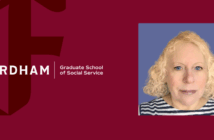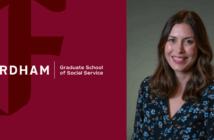Dr. Tina Maschi worked in prisons as a clinical social worker. She worked inside the hospitals of juvenile delinquent centers, correctional hospitals, and conducted research in the justice system. She witnessed considerable suffering as a mental health social worker.

Contributed photo
In addition, Maschi is an artist, musician, and educator. But how did she succeed through all these experiences?
Her answer: ingenuity, resiliency, and authenticity. That’s also what Maschi’s newest book, Aging Behind Prison Walls: Studies of Trauma and Resilience, preaches when it comes to incarcerated older adults and their experiences.
“A lot of older people in prison have been in lockdown for many, many years,” she said. “There’s much to be learned about their experiences and what they have to offer. The book not only looks at the issues – the many factors that cause the social problem of the aging prison population – but very cutting-edge, fresh, solution-focused strategies inspired by and sometimes even offered by older people in prison.”
In just ten years, over one-third of the prison population will be 50 or older. This is a problem, Maschi said, determined by personal, cultural, and social structural factors, from the individual to the community. Aging draws on qualitative and quantitative research; national datasets; and narrative case studies that present stories of trauma, coping, and well-being to find a solution. The data-driven solution is what she refers to as a Caring Justice Partnership.

The Caring Justice Logo Designed by Dr. Maschi
“Principles such as care and justice are free-form concepts,” she said. “They live in our heart, mind, and soul.”
Maschi said the criminal justice system is rightly critiqued for its harshness and cruelty, and should be remedied. Yet, she said, we should also recognize the presence of love and compassion, even in lockdown. Some examples include how older adults mentor younger adults and youth in prison, or a compassionate social worker who assists an older person reentering society to find housing and other services.
“Many incarcerated people have given freely of their time for my research studies,” she said. “The main reason they did so was because they wanted to give back to society, to help others.”
Her Start in the Field
Maschi grew up in what she describes as a “stressful” home environment, where she witnessed and experienced childhood mistreatment. She, like many LGBTQIA+ people, endured ostracism or punishment for deviating from the “norm.” She also has vivid memories of the Civil Rights Movement, and the televised violence of community uprising and assassinations.
“I remember the famous murders as if they were happening today,” she said. “[John F.] Kennedy was shot, Martin Luther King Jr. was shot, Robert F. Kennedy, Malcom X – the people looking for change, all one after the other.”
Since then, the question of why people who care about each other sometimes harm one another, and how that continues to be perpetuated, has underpinned her entire career. But through her adolescence and her research, she always found resiliency, authenticity, and love.
“Even from childhood, I knew that love, peace, and justice will always prevail. It was clear to me,” she said. “There’s nothing stronger than the human spirit to overcome any adversity. And as a small child, out of the contrast of what I didn’t want, was the vision of what I did want.”

“This is my non-biological son, Micah, standing in front of a quote from the Book of Micah: To Do Justly and To Love Mercy and to Walk Humbly with Thy God,” Maschi said. “It is the young that can show us again how to lead.”
Her mindset paid off. Now, Maschi touts a resume full of accomplishments: first-generation in her family to attend college, doctoral recipient, full professor, author of countless books, and being one of the leading authorities on forensic social work are some of the highlights – among many others.
“Anyone who’s surviving a traumatic experience, when they get to the point of re-discovery where they move from the point of being a victim to being the creator of their experience – they recognize that they can be happy, move forward, and not only survive but thrive despite the conditions,” she said.
Aging Behind Prison Walls
For some, spending time behind bars is a fate worse than death. How can someone overcome that daunting sentence?
Maschi said it largely comes down to emotional mindset. And through the process of obtaining that mindset, incarcerated people can find freedom, growth, and joy, even when confined to a cell. Many do maintain a positive outlook, Maschi said, and tap into inner and outer resources and resilience.
“Even in prison, many choose to make the best of it,” she said. “If there’s space between the stimulus and the response, a conscious person, group, or collective can find freedom by the simple choice of an emotion.”
In this case, the stimulus would be the prison sentence, and the response would be how the incarcerated person acts toward their situation. If we can master that gap in our minds, Maschi said, we can vastly improve how we react to troubling scenarios. According to Maschi, those suffering isolation during COVID-19 can use that same mindset.
I asked her what the coping process looked like for someone who receives a life sentence. Is the same process still applicable? Because for those isolated during COVID-19, or for a three, five, or even ten-year prison term – there is an end in sight, somewhere. What about those who get to prison and know they’re never coming out?
“I think it would be different,” she said. “For the person who’s had a long-term prison sentence, there are benefits if they make the best of it – where they’re mentoring people and they have a purpose or find meaning in the situation. It’s not that they want to stay in prison, but while they are there, they find it rewarding because they’re helping younger people turn their lives around.”
In addition, Maschi said that in these situations, we need to take a look at the system surrounding the individual. Perhaps the solution is within the problems of that structure.
“If that person is doing wonders for younger people inside, might we consider a possibility to release this person who did this crime a long time ago, if their record has been exemplary, and they’re helping people?” she asked. “In the community, we’ve got kids on the street that need help and are longing for a wise elder they can listen to.’”
The Stigma of Prison
Not everyone will advocate for incarcerated persons. Even fewer will go inside and find out how to help.
We’ve all heard the stigma around those who end up in prison: once a murderer (or thief, or any other crime), always a murderer. Some don’t have faith in an incarcerated person’s ability to cope, change, and thrive in their situation. For those who believe in that stigma, Maschi said they need to look inside: not in the prison – at themselves.
“There’s a saying that says, to forgive is to let the prisoner free, and realize that prisoner is you,” she said. “The message in my book is, look inside yourself – if you take a bird’s eye view of the situations that lead up to the incarceration of people, there’s no one ‘perpetrator’ you can point to that contributed to this situation.”

Seven Dimensions of Coping Resilience from Maschi’s Hartford Prison Study
Holding oneself accountable, Maschi said, is crucial to practicing forgiveness. We must realize that no one is perfect – and perhaps that kid who got caught stealing, now sent off to juvenile hall, was trying to provide for their family.
“If we’re in the community, and we’ve let this thing happen, knowing that it decimates families, are we not part of the entire group of actors in this play of life?” she asked. “We’ve all had some kind of transgression that we feel shame about, that we feel guilty about, and if we are the self in the social mirror, and we’re looking at the mirror and we don’t have compassion for that person, that suggests look inside.”
Practicing Reflection at Fordham
Maschi describes forensic social work practice as social work at the intersection of public health, public safety, justice, and the law. In this practice, the social worker must navigate their duty to clients as well as the community and society at large. In order to practice most effectively, Maschi said, a social worker must be flexible and equipped with the emotional mindset and skills to deal with these delicate issues.
Additionally, Maschi is particularly attentive to shifting the narrative of discrimination, victimization, and criminalization of the LGBTQIA+ population, especially those with multiple intersectional identities and social locations (e.g., race, gender, age, class, and immigration and disability status). Her article, “Coming Out of Prison: An Exploratory Study of LGBT Elders in the Criminal Justice System,” unpacks factors that foster resilience among this population. Other efforts include her Rainbow Justice Project on the LGBTQIA+ community, including two documentary shorts.
“Similar to my childhood experience, I also don’t want to see what happened to me when I was in my doctoral program,” she said. “I was told by my dissertation advisor to not study the LGBTQIA+ population or I would not get a job. It is a different time now, where LGBTQIA+ are the researchers who conduct the research.”
Maschi brings 15 years of clinical experience, and over 30 years in the field, into the classroom. She believes the lived experience that she and other faculty members at Fordham have makes GSS stand out from the rest of the social work pack.
“At Fordham, students can learn multiple ways of practice,” she said. “Learning through clinical practice, all that wisdom through understanding of self and connection with another, and the knowledge of the most cutting-edge evidence-informed practices, [helps]to develop or validate your clinical hunches.”
Maschi, who also does work in community reentry, has developed a solution-focused participatory community intervention model for use in communities with complex social issues. Students, serving in graduate assistantships, helped prepare the presentations and co-authored publications related to this project. Maschi said Fordham’s commitment to social justice has allowed so many to make a difference.
“There’s plenty of examples of people who have gone through Fordham and have created community-based agencies that have made a difference,” she said. “I chose Fordham because of their service and social justice mission – it’s one of a kind.”
Service being the key word there. It’s the apotheosis of a Fordham GSS education.
“We are the only graduate school of service,” she said. “Service is a form of high-order practice. We are here to serve. You’re doing it from a place of selflessness.”



